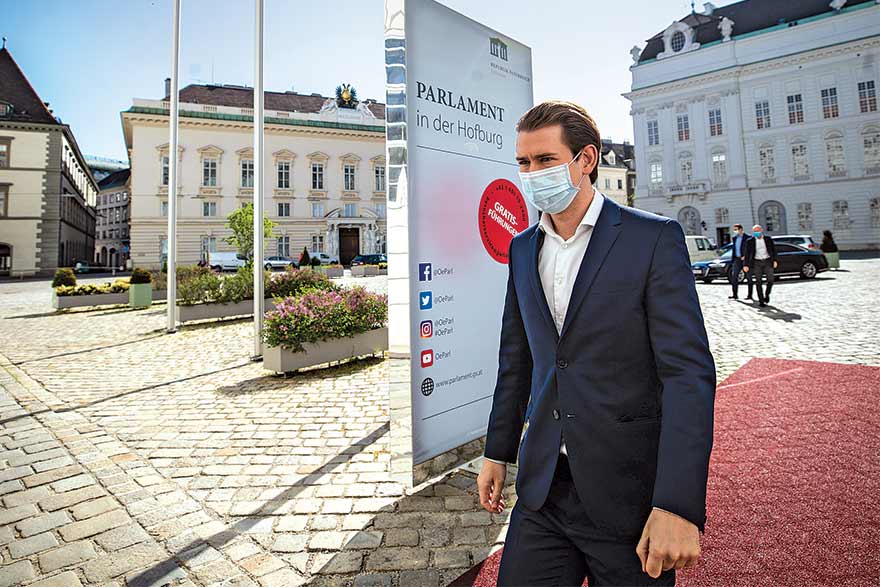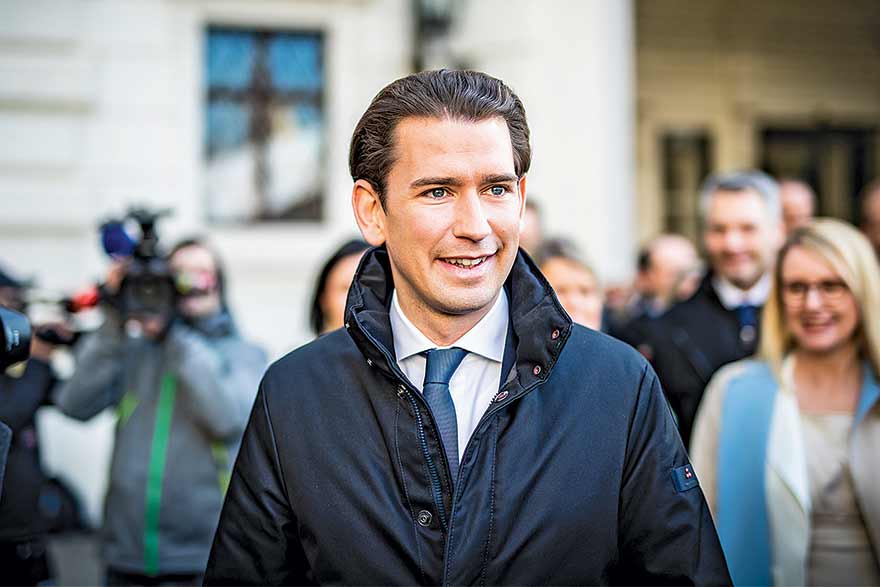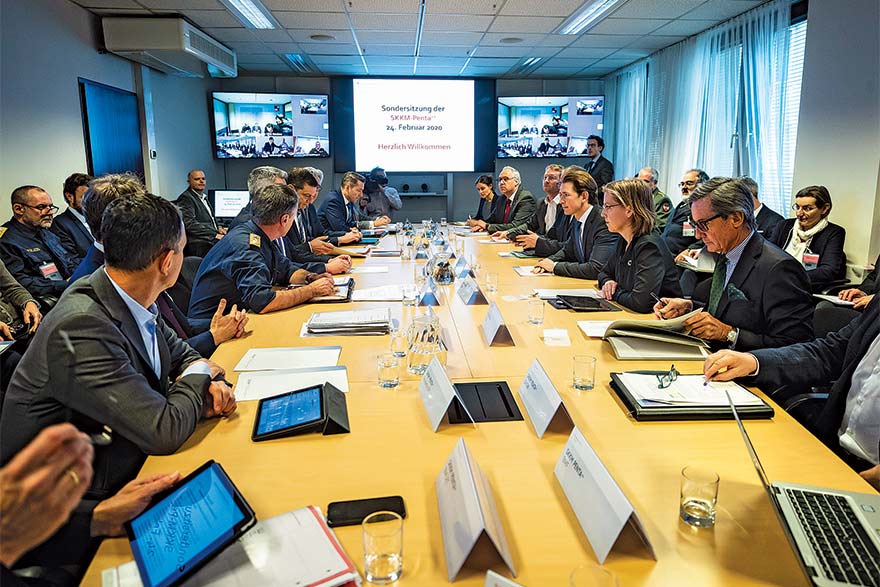Like the rest of the world, the COVID-19 pandemic and the necessary containment measures shape Austria’s economic development considerably. GDP losses were as high as two billion euros per calendar week during the first lockdown in the spring, and we ultimately incurred COVID-19-related GDP losses of 8.3% in 2020 – Sebastian Kurz
Ahead of us are two to three tough months – said Chancellor Sebastian Kurz speaking to his fellow Austrians in early 2021, announcing the third lockdown since the start of the Coronavirus Pandemic. Like the rest of the world, Austria is hoping for vaccination, but restrictions on movement and business, especially in the hospitality and tourism sector, must remain in place until the necessary doses of vaccine reach citizens. In this interview for CorD Magazine, the Austrian chancellor explains why he decided to add restrictions on the entry of citizens from the Balkans to a set of already unpopular measures.
Chancellor Kurz, you stated at the end of last year that you believe this novel coronavirus will have been defeated by the summer of 2021. What can you say at this moment; what stage are we currently at in this struggle?
In this coronavirus pandemic, the world faces unprecedented challenges in all sectors of society. Currently, we are especially tackling the spread of the virus to save lives and preserve healthcare capacities, while at the same time providing support for the economy and alleviating the impact on our country through measures put in place over recent months. We will have to expect that the fight against the pandemic will last another few months and we will monitor developments very closely, and with the utmost attention.
What are plans in Austria like for vaccination and will the announced 900,000 be used by March?
In addition to our testing strategy, vaccinations are a core component of our fight against the pandemic. We have made sure to speed up the process of our vaccination strategy by starting earlier than initially planned, expanding the target groups of the first phase and inoculating vaccines as soon as possible after their delivery. We currently expect to receive approximately 1.1 million doses of approved vaccines by the end of March.

With the introducing of strict measures to combat the spread of the virus, you also opted for some measures that are seen as discriminating against Austrian citizens with origins in Serbia and other Western Balkan countries. Entering Austria during the Christmas holidays was extremely difficult for them. Why is that the case, given that the Balkan region has recorded both fewer infections and fewer deaths than EU countries?
Stricter measures regarding travel were introduced for everyone travelling to Austria, independent of their origin, after careful consideration of evidence-based facts and the lessons learned since the beginning of the pandemic. For example, during summer, a third of all new infections were imported by people travelling abroad and returning with the virus. This is the reality. As we know, that was the case not only in Austria but also in numerous other countries. Consequently, we decided to put stricter regulations in place.
You decided to open Austrian ski resorts to tourists for the winter season, thus rejecting the proposal of Germany, France and Italy to wait for the epidemiological situation to improve. What guided you in bringing this decision?
Under the current regulations, outdoor sports facilities are open subject to strict provisions, such as a minimum distance of one metre and a capacity limit. Even stricter regulations apply to ski facilities, where, for example, FFP2- masks are mandatory. Moreover, the respective regional authorities can determine additional measures, and ski lift operators have developed detailed safety concepts. The Federal Government enacted these measures to provide for a safe skiing season, in addition to the travel and quarantine regime currently in force, on the one hand, and the general lockdown that includes the closure of hotels and restaurants, on the other.
Stricter measures regarding travel were introduced for everyone travelling to Austria, independent of their origin, after careful consideration of evidencebased facts and the lessons learned since the beginning of the pandemic
What were the consequences of COVID- 19 for the Austrian economy in 2020?
Like the rest of the world, the COVID-19 pandemic and the necessary containment measures shape Austria’s economic development considerably. GDP losses were as high as two billion euros per calendar week during the first lockdown in the spring, and we ultimately incurred COVID-19-related GDP losses of 8.3% in 2020. The Federal Government quickly launched a comprehensive and nonbureaucratic package to combat the economic consequences of the Coronavirus pandemic.
As early as 18th March, our package totalled 38 billion euros, which equates to almost 10% of national GDP. Our Coronavirus short-term programme, in particular, continues to help safeguard employment. After a sharp slump in the first half of 2020, we saw a significant recovery in Q3 2020. However, any possible new wave of infections could continue to slow economic recovery.
You describe yourself as a friend of the Western Balkans. As the chancellor of a country that supports the idea of this region’s European integration, how do you explain the fact that neither Albania nor North Macedonia saw the launch of their membership negotiations in 2020, while Serbia didn’t open a single new accession negotiation chapter? Does the problem lie with the Balkans or the EU?
Yes, Austria remains a friend of the Western Balkans, also in times of crisis. Our support for the region in the fight against the COVID-19 pandemic is a top priority and is ongoing. Austria will help the Western Balkan countries and provide vaccines. For instance, we recently pledged 2.4 million euros for the COVAX initiative, while the EU recently decided to make 70 million euros available to finance immediate vaccine support for the Western Balkans. Swift vaccinations will be decisive in ending the pandemic and launching the socio-economic recovery.

Austria continues to support the region’s path to EU membership fully. North Macedonia, in particular, has developed into an exemplary EU candidate, and I regret that it was not possible to open accession negotiations in 2020. Austria will advocate for the launch of long-overdue membership negotiations with North Macedonia and Albania in the first half of 2021.
We all only stand to lose from unnecessary delays in the enlargement process. The future of the whole region lies in the EU, and it is in our strategic interest to bring the region into the EU as quickly as possible.
Serbia has a clear EU accession perspective, with 16 negotiating chapters opened and two provisionally closed. I welcome that the new government has prioritised EU integration, preservation of public health and economic growth, as well as the EU facilitated Belgrade-Pristina Dialogue. Serbia has a unique responsibility in demonstrating that this region is forging ahead on its European path by significantly accelerating its own reform efforts and delivering concrete and tangible results in the rule of law and other fundamental areas. Continuous engagement in good faith to negotiate and achieve a comprehensive and legally binding normalisation agreement is crucial to progress on the European path.
Our support for the region in the fight against the COVID-19 pandemic is a top priority and is ongoing. We recently pledged 2.4 million euros for the COVAX initiative, while the EU recently decided to make 70 million euros available to finance immediate vaccine support for the Western Balkans
A terrorist attack occurred in Vienna at the peak of the struggle against the health and economic consequences of the Coronavirus Pandemic. To what extent did this act disturb the citizens of Austria and can it disrupt the attitude of the nation towards immigrants who account for a large percentage of the Austrian population?
During this heinous terrorist attack, four innocent people were killed and many more were injured. It was not only an attack against these innocent people, but against all of us, against our European way of life and our free society.

Our reaction is clear: we will not live in fear; we will not change our way of life. But we will fight terrorism, extremism and the ideology behind it, political Islam, with all means. They have found new fighters and supporters in Europe since their military defeats in Syria, Iraq and Libya. The goal of the terrorists is to divide our societies, but we will not let that happen. This is not a conflict between different religious groups or between Austrians and migrants; it is a conflict between the many who believe in peace and the few who seek war.
What do you expect from the package of new anti-terrorism laws that was proposed after the attack in Vienna?
The planned anti-terrorism package is to be adopted in the coming weeks and represents an important step in the fight against terrorism. Most notably, it comprises the electronic surveillance of convicted terrorists after their imprisonment, a criminal law provision against religious extremism and other preventative measures to combat foreign terrorist fighters.
Serbia has a unique responsibility in demonstrating that this region is forging ahead on its European path by significantly accelerating its own reform efforts and delivering concrete and tangible results in the rule of law and other fundamental areas
This law introduces categories, such as “political Islam”, as a criminal offense. It also introduces the possibility of preventative detention. It is also possible to deprive convicted terrorists of their citizenship and revoke social benefits. Is this package in line with international standards when it comes to respect for human rights?
The current proposal strengthens the fight against terrorism, in particular religiously motivated extremism, independent of religious denominations. Freedom of religion will also be guaranteed in the future. Foreign terrorist fighters are nonetheless ticking time bombs. Even if they have served their prison sentences, they are still a threat to our societies. We will make it possible to keep them under electronic surveillance for longer.
Additionally, we will make it impossible for convicted terrorists to obtain a licence to carry firearms or work in safety-critical areas by introducing a register for persons posing a threat to public safety. Furthermore, there will also be a register of imams in order to avoid radicalisation. Our goal is to prevent young people from being misled, brainwashed and radicalised. We want to avoid them becoming a threat to our societies. These laws are not against a religion, but against extremism and dangerous ideas that undermine our constitution.
| PANDEMIC
We will have to expect that the fight against the pandemic will last another few months and we will monitor developments very closely, and with the utmost attention | VACCINATIONS
In addition to our testing strategy, vaccinations are a core component of our fight against the pandemic | REGION
In our Consular Section we see new applications almost every week from Serbian students wanting to study for longer periods in Portugal in the most diverse areas |
|---|
Photo: Arno Melicharek